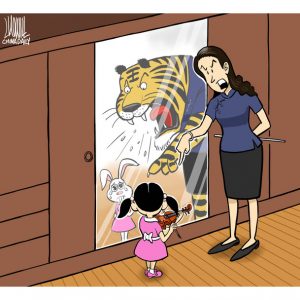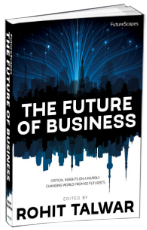13 Apr Helicopter Moms in Tiger Dresses
‘Tiger mother’ Amy Chua refuses to let her children go to play dates and sleepovers. She protects them from the evils of TV and computer games. She protects them from a whole world outside of violin practice and top grades. Are these types of parents really the opposites of indulgent Helicopter parents or are they rather the extreme version of them?
Amy Chua is hardly the first remarkable Tiger mother. As she proclaims herself, Chinese parents and parents who are first generation immigrants, are often much more authoritarian than ’Western’ parents. So why is she getting so much attention in the media? Good timing is probably the answer.
The U.S. and some other Western countries are currently going through the deepest recession since the depression of the 1930s. Anybody who follows the news or who is sensing the threat of lay-offs looming at their workplace can testify that our time is indeed characterized by economic distress – not to mention wars and other upheavals. These disturbances create a need for control. And what better way to control your environment than to discipline and control your own situation – or offspring?
In times of crises parenting styles tend to become more authoritarian, and this tendency often lag even after times have changed for the better. Children growing up today are expected to save the world from economic and climatic challenges – no small deed! Likewise, the 1930s and 40’s were dominated by the fear of economic ruin and Nazi world dominance, which rubbed off on family structures during the war and it’s aftermath. Nazism and fascism are in themselves authoritarian ideologies, confirming the signs of those times. After the war, the discipline and ‘can do’- mentality needed to rebuild countries and implement new social programs fed on a social climate that had pretty much grown used to self-discipline and blind obedience – sometimes even at the expense of social criticism. Everybody knew their rank, woman under man, children under women and colored people under white people. Despite the era’s economic development this system was culturally pretty oppressive.
As the economy grew more robust, old conventions eventually grew too rigid as well. The “Silent Generation” who grew up in this era started the Cultural Revolution in the 1960s. Post-materialist values made their appearances, which brought about the civil rights movement, the women’s liberation movement and more relaxed forms for child rearing. Children were no longer only to be seen but now also to be heard – that is, whenever their small voices weren’t drowned out by fighting matches between their overworked, sometimes divorcing parents.
While children from affluent families grow up as emancipated individualists, those who grow up in sparser conditions learn values such as obedience and adaptability. We see this tendency in U.S. surveys on attitudes towards corporal punishment. “Spanking” is more often used in working-class families who raise their kids to become authority-fearing workers than in middle-class families. Middle class children are often nurtured to become “tomorrow’s leaders” by means of sophisticated pedagogical approaches that usually emphasize freedom and creativity.
Despite all of it’s controversy, Yale professor Amy Chua’s version of “tough love” does not conjure up images of the angry father who pulls his son by the ear to the woodshed for a beating. Chua punishes her kids for ‘shortchanging’ and therefore victimizing themselves, not for inconveniencing their parents. But her methods are no less wicked and far more cunning. Yet, reverberating in Dr. Chua’s awareness is her immigrant father’s self-denial and long working hours. These are the memories that define her parenting philosophy, and not her upper middle class penchant for house concertos.
In the 1980’s and 90’s, parents began to pull back the freedom (or indifference) the Generation X children had enjoyed (or suffered). Mozart tunes, muddled by their mother’s amniotic fluid, have been played for the Millennials from early fetal age as this was supposed to increase their IQ. Well-educated mothers gave up their careers and stayed home to protect their little Einsteins from long days in day care centers. And when they grew up fat and lazy, it was not because the parents did not care, but because it was too dangerous to play outside. But while helicopter parents blame their children’s teachers for mediocre school results, the tiger children feel the full brunt of their parents’ disappointment. The urge for protection has many outlets. Tiger parents seek protection from a vulgar, mediocre world outside whereas helicopter parents protect their children from poor self-esteem. But for both types of parents, the narrow, micro-managed road to success is the highest of priorities.
Like their predecessors, the Homelanders or Gen Z will grow up with tight reins, which eventually will lead to a more or less quiet revolt. We don’t know what they will revolt against, but the tighter their leashes – or the more antiquated today’s social norms will feel in the future – the more they will try to break loose and redefine what will become the new normal. Maybe by choosing not to RFID tag their own kids. Or by electing not to genetically enhance their embryos. Who knows?
Unsurprisingly the majority of Chinese mothers (in China) who were surveyed agree with Chua’s parenting style (55.1) But it’s also interesting to note that a large minority disapprove (41.2%). Maybe we can see a budding trend where newly affluent China allows itself to relax whereas Western debt-ridden countries pull in their reigns in anticipation of future hardships?



Sorry, the comment form is closed at this time.